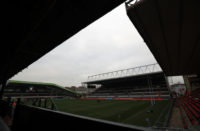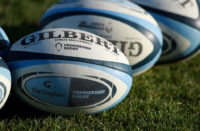 The England 2015 Rugby World Cup fanfare gets underway for real at Twickenham on Wednesday when the IRB announce their ticketing strategy, including distribution and pricing, and confirm match kick-off times.
The England 2015 Rugby World Cup fanfare gets underway for real at Twickenham on Wednesday when the IRB announce their ticketing strategy, including distribution and pricing, and confirm match kick-off times.
What will not be on the agenda as the IRB blow their own trumpet are the glaring mistakes in a 2015 schedule which is verging on the shambolic, and where ticket prices for big matches will be eye-wateringly steep.
Even more concerning are the big gaps between the truly competitive fixtures in the schedule, everywhere other than the ‘Pool of Pain' involving England, Wales and Australia (Pool A).
One of the reasons for this is that the IRB's strategic plan, which was formalised in 2004 to make sure the so-called Tier 2 nations advanced to join their Tier 1 counterparts, has fallen a long way short of its targets.
The plan was designed to get Tier 2 teams like the USA, Canada, Fiji, Tonga, Samoa, Japan and Romania competitive with the Tier 1 elite who play in the Six Nations and the Rugby Championship.
The IRB's publicly stated aim was to have eight Unions capable of reaching the World Cup final in 2011, and ten Unions capable of doing so by 2015. So far, only four Unions have won it (NZ, SA, Australia and England), and only five (add France) have played in the final.
The dearth of competitive sides explains why the 2015 World Cup will not start with a great game between well matched nations, as it did in the 1995 tournament when the hosts, South Africa, played the holders, Australia.
Instead, England open the tournament at Twickenham against Oceania 1, which will probably be Fiji. The Fijians are not easy-beats, but by the same token they have never had a win over England, and if they changed that pattern at Twickenham on Friday, September 18, 2015, it would be a seismic shift.
The tournament then meanders through 13 more fixtures, most of which are mismatches, with the exception of France v Italy, and New Zealand v Argentina. However, seeing that France have lost to Italy only twice in their 14 meetings since the Azzurri joined the Six Nations, and that New Zealand have never lost to Argentina in 18 Tests, the deck is heavily stacked against any upsets.
As a consequence, the first gripping fixture in the 2015 schedule does not come until match 14, when England play Wales at Twickenham with the tournament already in its eighth day.
It is not easy for a tournament to generate genuine interest and build any sort of momentum based on a schedule where there are so many games in which, while not all complete mismatches, the outcome is not so much a matter of who wins, but by how many points.
The contradiction is that the host nation are locked in a life or death struggle in by far and away the most brutal group in the tournament, where they are joined by two more of the world's top six teams, Australia and Wales.
This is due entirely to the vagaries of a seeding system which, with breathtaking disregard for its potentially detrimental impact on the tournament, was decided in 2012 almost three years before the first game is played. The main rationale for this is that it helps to maximise the commercial programme, even if it is at the expense of either England, Wales or Australia heading for the exit before the knockout stages.
By way of comparison, the seedings for the 2014 Football World Cup in Brazil were based on FIFA rankings in October, a mere nine months before the tournament begins.
It is hard to believe that any other professional sporting organisation would have contemplated the own goal that the IRB have managed by putting the hosts, England, and their nearest neighbours, Wales, in jeopardy in the first stage of the event.
It is not that anyone is calling for special treatment for the hosts, just a more balanced seeding system across the four pools. If you rate the competitiveness of the pools on the basis of adding up last weekend's IRB world rankings for the three leading teams in each, the folly of doing the draw so early is highlighted clearly in the stark imbalance between Pool A and the rest.
Should England fail to make it out of the pool stage, the organisers will be left to contemplate a tournament that bombs in terms of public interest.
Another serious concern is the lack of attractive midweek matches that do so much to keep the interest in the tournament buoyant. Of the eight matches scheduled between the weekend action, none of them see the big seeds in any of the pools matched against each other.
One of the reasons for this is that the tournament's host broadcaster, ITV, had concerns that the 2015 World Cup midweek matches would clash with their coverage of football's Champions League. The only hitch with that is that since the draw was made, ITV have lost the live rights to the Champions League, having been outbid by BT Sport.
However, the midweek schedule cannot now be ammended. It is another instance of the inflexibility built into the Rugby World Cup schedule. The reality is that the IRB are now guilty of putting the commercial cart so far ahead of the horse that pulls the show, i.e. the rugby on the field, that they are diminishing their showpiece event.


























